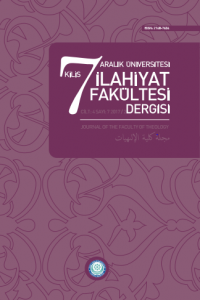Öz
In this study, we dealt with the viewpoints of
Islamic Philosophers Kindî, Fârâbî and İhvân-ı Safâ Community on the sciences
that should be learnt before philosophy. For this, firstly, we examined the
definitions of these philosophers on philosophy and their purposes in learning
it. Kindî determined that mathematics, logic and physics should be learnt before
philosophy. Fârâbî, on the other hand, claimed that ethical values should be
sufficient first, and then geometrical proofs and logic should be learnt
afterwards. Ihvân-ı Safâ, which was in the same century with Fârâbî, claimed
that mathematics, geometry, music, astrology, logic and natural sciences, which
corresponded to physics, before philosophy (metaphysics). In order to assess
this topic in terms of our present time, in the last section, we examined the
curriculum of philosophy in Turkey with a general viewpoint. We also
investigated the curriculum under three categories as history of philosophy,
the specific subjects in which philosophy was interested, and logic classes. We
also examined the learning method of philosophy of Islamic scholars, which
brought benefits and ease for preparing the mind for abstract knowledge and to
facilitate understanding. Although our up-to-date educational curriculum is
considered to be sufficient in providing information, we may claim that we do
not have a preparation that will enable the efficient learning of this
knowledge. For this reason, we defended that idea that classes with
mathematical contents should be added to the curriculum. When we accept that
the subject of philosophy is not metaphysics, this situation does not change,
and there must be physics, chemistry and similar subjects to know scientific
developments to associate them with philosophy.
Anahtar Kelimeler
Islamic Philosophy Philosophy Teaching Kindi Farabi Ihvan-ı Safa
Kaynakça
- Âmirî (2005). “İslâm’ın Üstünlüğü”. İslam Filozoflarından Felsefe Metinleri içinde (Çev. M. Kaya)., (s. 197-204). 3. Baskı, İstanbul: Klasik.
- Beitia, A. Cortabarria (1982). “Kindî’de İlimlerin Sınıflandırılması”. Atatürk Üniversitesi İlahiyat Fakültesi Dergisi. Çev: Emrullah Yüksel. S. 5. ss. 219-243.
- Çetinkaya, B. A. (2005). “Bilimler Ansiklopedisi Klasiği Olarak İhvân-ı Safâ Risâleleri”. Dinî Araştırmalar, (VIII/22), 263-286.
- Fârâbî (1997), İdeal Devlet, Çev.: Ahmet Arslan, Vadi Yayınları, Ankara.
- Fârâbî (2005). “Felsefe Öğreniminden Önce Bilinmesi Gerekenler” İslam Filozoflarından Felsefe Metinleri içinde (Çev. M. Kaya), (s. 109-116). 3. Baskı, İstanbul: Klasik.
- Fârâbî (2008a). Kitâbu’l-Burhân (Çev. Ö. Türker, Ö. M. Alper). İstanbul: Klasik.
- Fârâbî (2008b). Harfler Kitabı (Çev. Ö. Türker). İstanbul: Litera Yayıncılık.
- İbn Sînâ (2004). Metafizik I (Çev. E. Demirli, Ö. Türker). İstanbul: Litera Yayınları.
- İhvân-ı Safâ (2012). İhvân-ı Safâ Risaleleri (Çev. A. Durusoy, B. A. Çetinkaya vd.). İstanbul: Ayrıntı Yayınları.
- Kindî (2002). Felsefî Risâleler (Çev. M. Kaya). İstanbul: Klasik.
- Sergejew, I. &Winter, K. & Bloch E. (2016), İbn Sina Aklın Ustası, Çev.: Mehmet Çallı, Gazi Ateş, Evrensel Basım Yayın, İstanbul.
- Uysal, E. (2000). “İhvân-ı Safâ”, İslam Ansiklopedisi, C.: 22, 1-6.
Öz
Bu çalışmamızda İslam filozoflarından Kindî, Fârâbî ile
İhvân-ı Safâ topluluğunun, felsefe öğreniminden önce öğrenilmesi gereken
ilimler hakkındaki görüşlerini ele aldık. Bunun için öncelikle söz konusu
filozofların felsefe tanımları ve bu ilmi öğrenmedeki amaçları üzerinde durduk.
Kindî, felsefe öğreniminden önce bilinmesi gereken ilimleri matematik, sonra
mantık, sonra da fizik olarak belirlemektedir. Fârâbî ise önce ahlaken yetkin
olmayı şart koşmakta ardından da geometrik ispat şekillerinin ve mantığın
öğrenilmesini gerekli görmektedir. Fârâbî ile çağdaş olan İhvân-ı Safâ,
felsefeden (metafizikten) önce bilinmesi gereken ilimleri sırasıyla matematik,
geometri, müzik, astroloji, mantık ve fiziğe denk gelen doğa bilimi olarak
belirlemektedir. Meseleyi günümüz açısından değerlendirebilmek için son bölümde
Türkiye’de felsefe bölümlerinin müfredatını genel bir bakış açısıyla inceledik.
Müfredat derslerini felsefe tarihi, felsefenin ilgilendiği konu ve alanları
içeren spesifik dersler ve mantık dersleri şeklinde üç kategoride ele aldık.
Sonuç olarak İslam filozofları tarafından önerilen felsefe öğrenim metodunun,
zihni soyut bilgilere hazırlamak ve anlamayı kolaylaştırmak için sağladığı
faydalara değindik. Güncel eğitim müfredatımız bilgi verme noktasında yeterli
görülse bile yine de bu bilgilerin etkin öğrenilmesi sağlayacak bir
hazırlığımızın olmadığını ifade edebiliriz. Bu yüzden temel düzeyde de olsa
öğrencilerin seviyesine göre matematik içerikli derslerin müfredata eklenmesi
gerektiğini savunduk. Felsefenin konusunun metafizik olmadığını kabul
ettiğimizde de bu durumun değişmediğini, bilimsel gelişmelerden haberdar olmak
ve felsefeyle ilişkilendirebilmek için fizik, kimya gibi derslerin bulunması
gerektiği sonucuna ulaştık.
Anahtar Kelimeler
Kaynakça
- Âmirî (2005). “İslâm’ın Üstünlüğü”. İslam Filozoflarından Felsefe Metinleri içinde (Çev. M. Kaya)., (s. 197-204). 3. Baskı, İstanbul: Klasik.
- Beitia, A. Cortabarria (1982). “Kindî’de İlimlerin Sınıflandırılması”. Atatürk Üniversitesi İlahiyat Fakültesi Dergisi. Çev: Emrullah Yüksel. S. 5. ss. 219-243.
- Çetinkaya, B. A. (2005). “Bilimler Ansiklopedisi Klasiği Olarak İhvân-ı Safâ Risâleleri”. Dinî Araştırmalar, (VIII/22), 263-286.
- Fârâbî (1997), İdeal Devlet, Çev.: Ahmet Arslan, Vadi Yayınları, Ankara.
- Fârâbî (2005). “Felsefe Öğreniminden Önce Bilinmesi Gerekenler” İslam Filozoflarından Felsefe Metinleri içinde (Çev. M. Kaya), (s. 109-116). 3. Baskı, İstanbul: Klasik.
- Fârâbî (2008a). Kitâbu’l-Burhân (Çev. Ö. Türker, Ö. M. Alper). İstanbul: Klasik.
- Fârâbî (2008b). Harfler Kitabı (Çev. Ö. Türker). İstanbul: Litera Yayıncılık.
- İbn Sînâ (2004). Metafizik I (Çev. E. Demirli, Ö. Türker). İstanbul: Litera Yayınları.
- İhvân-ı Safâ (2012). İhvân-ı Safâ Risaleleri (Çev. A. Durusoy, B. A. Çetinkaya vd.). İstanbul: Ayrıntı Yayınları.
- Kindî (2002). Felsefî Risâleler (Çev. M. Kaya). İstanbul: Klasik.
- Sergejew, I. &Winter, K. & Bloch E. (2016), İbn Sina Aklın Ustası, Çev.: Mehmet Çallı, Gazi Ateş, Evrensel Basım Yayın, İstanbul.
- Uysal, E. (2000). “İhvân-ı Safâ”, İslam Ansiklopedisi, C.: 22, 1-6.
Ayrıntılar
| Konular | Din Araştırmaları |
|---|---|
| Bölüm | ARAŞTIRMA MAKALELERİ |
| Yazarlar | |
| Yayımlanma Tarihi | 15 Aralık 2017 |
| Yayımlandığı Sayı | Yıl 2017 Cilt: 4 Sayı: 7 |

